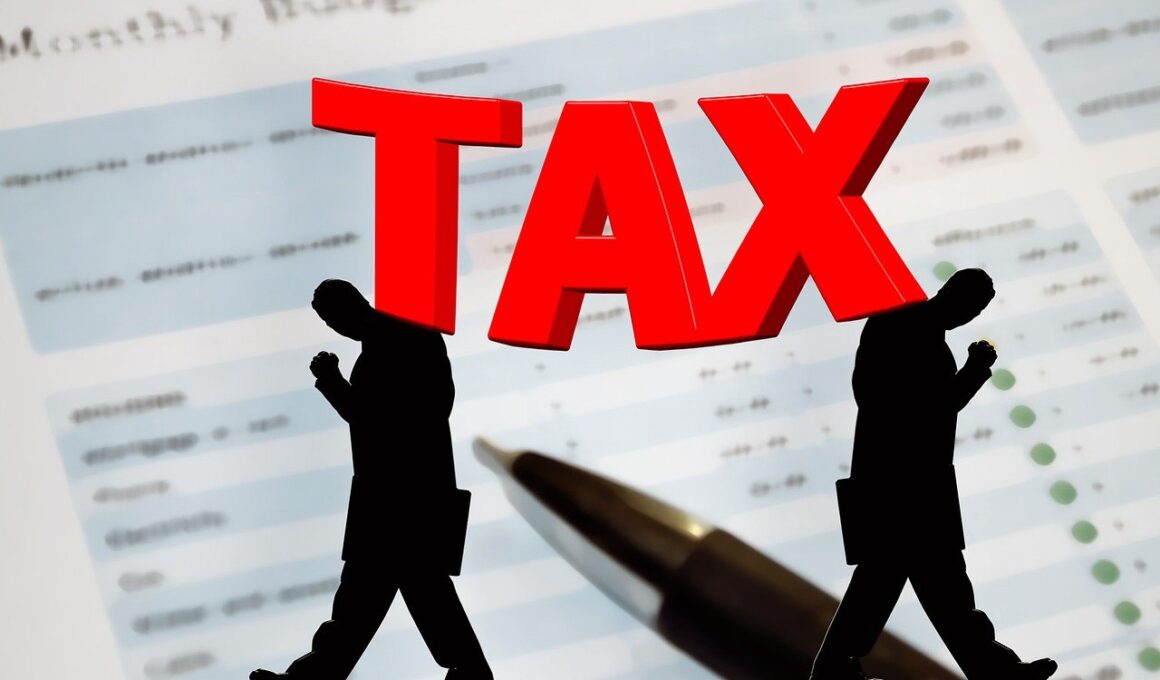Planning for Estimated Taxes to Avoid Surprises at Year-End
Tax planning is essential for small businesses, especially regarding estimated taxes. Many entrepreneurs fail to consider the significant implications of not planning correctly, leading to surprises at year-end. Small business owners must understand their tax obligations to avoid unexpected financial burdens. A practical approach to managing estimated taxes can ensure smoother cash flow and better financial decision-making. Business owners should start by assessing their taxable income for the year, considering all sources that contribute to it. Next, they should determine the applicable tax rate based on their income bracket. It is also essential to factor in any potential deductions and credits that could reduce taxable income. To make this process easier, utilizing accounting software or seeking professional tax advice can be beneficial. Overall, the goal is to project taxes accurately to set aside sufficient funds. This way, small business owners can fulfill their tax obligations without compromising their operating cash flow. In summary, a proactive approach to estimating taxes not only alleviates end-of-year stress but also fosters long-term financial stability for the business.
Small businesses often overlook the importance of maintaining accurate financial records throughout the year. This step is crucial for effective tax planning. Having your books in order allows for better forecasting, ultimately easing the task of estimating taxes owed. Entrepreneurs should prioritize keeping track of all income, expenses, and deductions. Making sure that receipts are stored and organized is equally important, as documentation is necessary during tax season. One useful method for organizing expenses is categorizing them as business-related or personal. This will streamline the process of preparing your tax returns, helping you to refine your estimates. Frequent reviews of financial statements help in identifying trends that may impact tax obligations. Additionally, business owners should regularly update their bookkeeping methods to align with current tax regulations. Many businesses find it beneficial to invest in accounting software to automate these tasks. Furthermore, hiring a tax professional can provide additional insights and strategies tailored for your business model. Ultimately, this enables small business owners to make better financial decisions. The more informed they are throughout the year, the less they will need to scramble when tax season arrives.
The Importance of Estimated Tax Payments
Making estimated tax payments can be a decisive factor in avoiding underpayment penalties. The IRS requires individuals, including small business owners, to pay taxes on income as it is earned rather than in a lump sum at year-end. Failure to make these payments can lead to significant tax liabilities unexpectedly when tax returns are filed. Business owners should schedule their estimated payments throughout the year, which are typically due on a quarterly basis. Understanding when these payments are due can prevent unnecessary penalties. It’s essential to follow IRS guidelines regarding how to calculate these payments accurately. Using IRS Form 1040-ES can assist in determining the estimated taxes owed. Remember that your payments must reflect the current income and projections to avoid penalties. Additionally, small business owners should account for fluctuations in revenue, which can affect estimated tax obligations. Making estimated payments also allows for better cash flow management. This proactive strategy reduces the pressure at year-end when suddenly sorting through all financial records. In doing so, small business owners can ensure they are financially prepared for tax obligations while avoiding surprises.
Understanding tax law changes is critical for effective tax planning. Tax regulations can change yearly, impacting estimated tax responsibilities. Entrepreneurs should stay informed about legislative changes affecting their computations. This can include various factors such as new deductions, credits, payment structures, or increased rates. Monitoring IRS announcements helps small business owners understand any relevant updates that could affect their financial planning. Engaging with professional advice can assist in interpreting how any changes impact your specific situation. Workshops or webinars focusing on tax updates can prove useful, as they provide relevant insights directly from reputable tax professionals. Adapting to new laws quickly can help avoid costly mistakes. Many businesses also find subscribing to tax newsletters can keep them updated on best practices and regulations. Since non-compliance with updated tax rules can lead to severe repercussions, ensuring timely adjustments in the estimated tax strategy is absolutely essential. Furthermore, technology offers innovative tools that alert businesses regarding potential tax law changes. This proactive stance not only reduces risks but also positions small businesses for long-term growth and compliance. Ultimately, being informed about tax law changes is a major aspect of effective tax planning for all small businesses.
Utilizing Tax Deductions
Every small business should take full advantage of the available tax deductions to lower their taxable income. Understanding and utilizing these deductions strategically can significantly impact the overall tax bill. Common deductions that small businesses may qualify for include expenses such as office supplies, travel costs, and employee wages. It’s pivotal to classify every expense accurately and systematically to identify all deductible items during tax season. Business expenses incurred in the ordinary course of operations often qualify for deductions, which helps to decrease taxable income. Moreover, reviewing state and federal tax deduction opportunities ensures that small businesses do not leave any money on the table. Record-keeping plays a critical role in claiming these deductions; thus, every receipt and relevant financial document must be accounted for. Additionally, tax professionals can help identify overlooked deductions. For instance, many small business owners qualify for specific home office deductions or health insurance expenses, which can reduce taxable income substantially. By maximizing deductions, small business owners can effectively reduce their tax liabilities, allowing them to reinvest savings back into their businesses. Hence, proactive planning for these deductions is vital for an effective tax strategy.
Engaging in tax planning should also include considerations for retirement contributions. Small business owners can benefit from various retirement plans allowed under tax law. Contributing to a retirement plan not only ensures future financial security but also offers immediate tax benefits. Contributions made to retirement accounts can be deductible, effectively reducing taxable income for the business. Plans such as a Solo 401(k) or a Simplified Employee Pension (SEP) are excellent options that allow for significant contribution limits compared to standard retirement accounts. This means that small business owners can both work towards their retirement savings goals and lower current tax liabilities. Additionally, early planning can optimize how much can be contributed, taking into account revenue projections. By adopting a suitable retirement plan, small business owners give themselves the dual benefit of tax relief and long-term savings. Consulting with a financial advisor or tax professional can provide tailored advice on the best options for your specific business needs. Furthermore, automating contributions ensures consistency and helps in tax planning simplicity. In summary, planning for retirement contributions is a wise strategy for reducing taxable income and securing your financial future.
End-of-Year Strategies for Tax Planning
As the year comes to a close, small business owners should engage in focused end-of-year tax planning strategies. Evaluating your tax situation before year-end can reveal opportunities for tax savings. Assessing earnings and expenses in late December allows business owners to make informed decisions quickly to ensure their tax obligations remain manageable. For instance, delaying income until the new year while prepaying certain expenses can also reduce this year’s taxable income. Additionally, reviewing inventory and considering write-offs or donations before the year concludes can help maximize deductions. Effective management of capital expenditures can also influence taxable income, allowing businesses to plan asset purchases strategically. Procrastination can lead to lost opportunities for minimizing tax liability, making it imperative to stay ahead. Communication with a tax advisor during this period is essential for identifying optimal strategies. Tax-loss harvesting, where owners sell off unprofitable assets, is another approach to manage taxes effectively at year-end. Lastly, adjusting estimated tax payments based on current year earnings will help avoid surprises at filing time. Thus, proactively approaching end-of-year tax planning can lead to improved financial outcomes.


